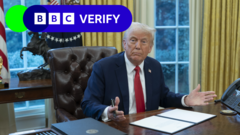The situation began to intensify when Trump enforced a blanket 10% tariff on all imports from China, affecting a wide range of products, from toys to electronics. In response, China announced its own tariffs targeting U.S. oil, agricultural machinery, and automobiles. This back-and-forth not only signifies an ongoing tit-for-tat but also fits the classic definition of a trade war, where mutual punitive measures can lead to unpredictable economic consequences.
Historically, trade wars tend to generate their own momentum, often resulting in heightened tensions that can quickly escalate. Trump has previously justified these tariffs as tools to bolster American manufacturing and realign trade imbalances, but critics argue that they can do more harm than good. The immediate challenges posed by these tariffs could deter companies from investing in integrated supply chains across North America, as the automotive industry exemplifies. Tariffs on components crossing borders could adversely affect productivity and, consequently, wages for workers in the sector.
The fear extends beyond North America as uncertainties loom over potential tariffs against Europe and other nations. Previous instances have shown that nations can indirectly benefit from U.S. trade policies, as was seen with countries like Vietnam and Malaysia during Trump's first term. Nevertheless, the global economy remains on high alert, grappling with the unpredictable fallout of Trump's aggressive tariff diplomacy, which could have a chilling effect on both domestic and international business confidence.
In the wake of these developments, analysts and economists remain skeptical about the long-term impacts as businesses weigh their future investments amidst a landscape of increasing uncertainty.
What do you want RTW News to investigate? US Economy, Trump Policies, International Trade War, Economic Forecasts, Business Impact
Historically, trade wars tend to generate their own momentum, often resulting in heightened tensions that can quickly escalate. Trump has previously justified these tariffs as tools to bolster American manufacturing and realign trade imbalances, but critics argue that they can do more harm than good. The immediate challenges posed by these tariffs could deter companies from investing in integrated supply chains across North America, as the automotive industry exemplifies. Tariffs on components crossing borders could adversely affect productivity and, consequently, wages for workers in the sector.
The fear extends beyond North America as uncertainties loom over potential tariffs against Europe and other nations. Previous instances have shown that nations can indirectly benefit from U.S. trade policies, as was seen with countries like Vietnam and Malaysia during Trump's first term. Nevertheless, the global economy remains on high alert, grappling with the unpredictable fallout of Trump's aggressive tariff diplomacy, which could have a chilling effect on both domestic and international business confidence.
In the wake of these developments, analysts and economists remain skeptical about the long-term impacts as businesses weigh their future investments amidst a landscape of increasing uncertainty.
What do you want RTW News to investigate? US Economy, Trump Policies, International Trade War, Economic Forecasts, Business Impact




















